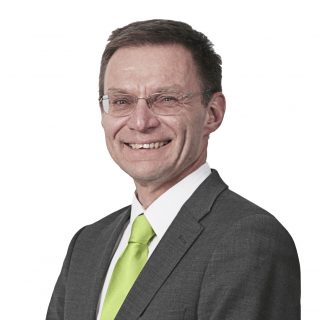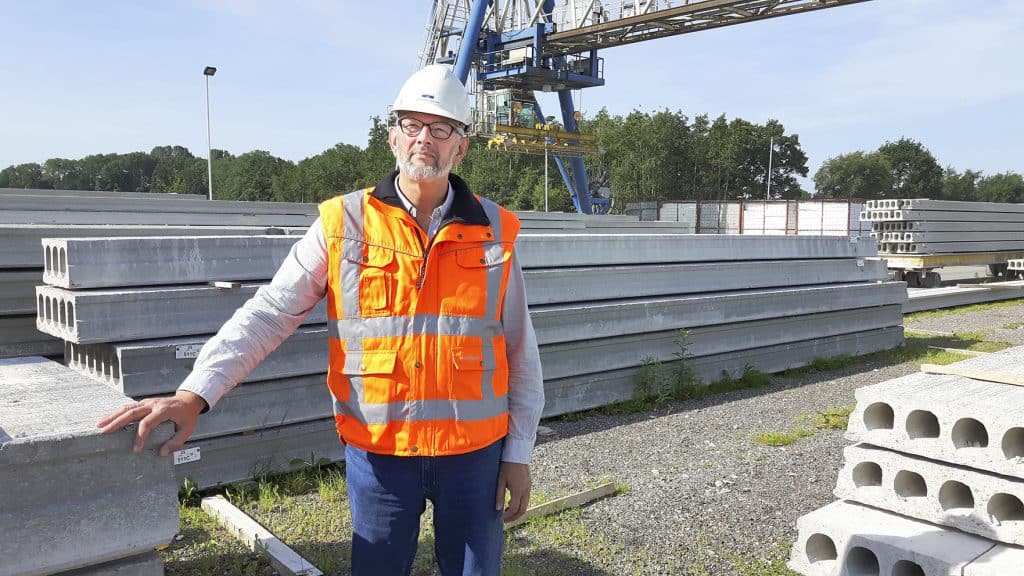Developing the closed loop process
In 1990 the first integrated recycling system was installed in the newly built VBI factory in Schuilenburg. A new factory in Huissen was established in 1999 with an improved recycling system, and better solutions for material recycling were already developed at that time. How was the closed material loop process developed?
“We had to reduce increasing disposal costs, create a clean work environment, and prevent sludge depots and waste heaps at the site. To achieve this, we had to learn to control and re-use waste streams of unhardened concrete and waste water; unhardened concrete from the recess vacuum cleaner, wrong mixtures, and waste flows resulting from cleaning activities,“ says Nico Eikelenboom, then production director at the VBI, who was in the team establishing the closed material loop at the VBI together with den Engelsman.
Eikelenboom continues that separating wash-out screws were already known from the concrete plants for transport concrete, but for VBI the challenge was mainly to be able to process the number of small particles washed-out of the unhardened concrete from the recesses.
The aim was to reuse all the unhardened waste streams as quickly as possible in the own production process and lead the streams to one central processing point for separating course materials and slurry with only fine particles. VBI used pumps to transport waste water through the wash-out system to separate residue particles.
“Dosage of the washed-out gravel and sand without the fine parts is no problem, with varying amounts of fine particles, the amount of active cement and the high alkaline properties, was a greater problem. On one hand because of the still present hardening properties – which may result in deposition and blockages – and on the other hand, the effect on the processing properties of the concrete mixture,” Eikelenboom describes the process.
“As a result, good accessible settling basins, ore tanks, were necessary for sedimentation of the fine particles. After sedimentation we have two components. At the bottom of the basin concentrated slurry and on top of that the relatively clean but high alkaline water. The relatively clean water is pumped to the next basin for further treatment with carbon dioxide. After this treatment the water reaches a pH 7 value and is suitable for reuse in the production process,“ den Engelsman describes.
The settled sludge from the bottom of the sedimentation basin is pumped into a basin that contains a stirring mechanism by which the slurry is kept homogeneous. From here the slurry is dosed into the concrete mixes.
Density fluctuations in the slurry are not accepted
In June 2017, VBI opened its fourth hollow-core production site in Kampen – with the latest technology in recycling.
The objectives for VBI in setting up the new factory was to come up with methods to reduce waste as well as minimize the environmental impact, and to reduce to maintenance costs of the machinery. The ultimate goal was to create a closed loop system for recycling the waste completely.
“Since the closed material cycle requirements could be taken into account from the very beginning of the set-up of the new factory layout in Kampen, the result is a totally integrated recycling installation,” den Engelsman says. The first step was to map all material streams and re-analyze every process and locate the very sources of process streams. Now that the system is running, the quality of all incoming and recycled solid and liquid raw materials is controlled by periodical measurements.
Slurry density needs to be stable.
“The fine particles highly influence the concrete mix, and the density must be very stable if it is to be used in concrete. Differences in the amount of fine parts will affect the workability of the mix. In concrete mix, fine particles are needed, and usually fillers are used. By re-using the fine particles of the slurry, less fillers are needed. Accuracy in re-using slurry is highly important, as high fluctuations cause quality problems,“ says den Engelsman.
All the waste is recycled in all VBI factories
As a result of technological improvements and re-designing the production in Kampen factory, all the waste from the production process is now fully recycled and re-used in a high-quality end product, and no waste water is drained in the sewer. The result is a closed loop that diminishes the damaging environmental effects and promotes economic objectives.
Besides monetary benefits, the closed material loop also improves working conditions by creating a clean, modern environment. Making sure that waste water is handled accordingly is also a matter of corporate responsibility.
“We are happy to share our information on the closed material loop and re-using slurry,” den Engelsman encourages other precast manufacturers when he’s asked if the closed material loop could be used more widely. He continues that water consumption depends on the amount of waste, so small plants may not be that interested, whereas for the bigger production units the closed material loop issue is more relevant.
“Naturally, the amount of waste water depends on the size of the production and concrete output. All VBI factories together recycle and reuse approximately 550 m3 of waste water, from which about 100 m3 of slurry is added back into the new concrete mixes every day. We can really make a difference by recycling that amount of waste,“ den Engelsman concludes.

